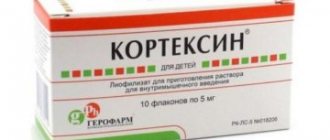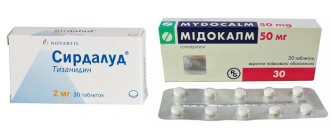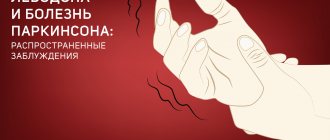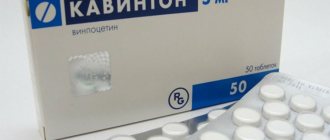Instructions for use
The treatment regimen and dosage of the drug is determined for each case individually.
At the initial stage of drug therapy, a minimum amount of the active substance is recommended, followed by an increase in the daily dose.
For dementia syndrome, a course of 3-5 weeks is recommended for adult patients.
Daily doses change weekly in the following order:
- 1st week – 5 mg;
- 2nd week – 10 mg;
- 3rd week – 15-20 mg.
The maximum norm is 30 mg.
To eliminate the signs of spastic syndrome due to pathology of the central nervous system, the following treatment regimen is proposed:
- 1st week – 10 mg;
- 2nd week – 20 mg;
- 3rd week – 20-30 mg.
The dose should be increased weekly by 10 mg to the maximum allowed amount of 60 mg.
When using tablets for preventive purposes, 10-20 mg per day is enough to achieve a maintenance effect.
For children over 1 year of age, the drug is occasionally included in therapy for damage to the brain and central nervous system. The daily dose is calculated taking into account body weight: 500 mcg per kilogram of weight. The resulting value is divided into several steps, distributing the time evenly throughout the day. The last use of tablets should be planned before dinner.
The duration of the treatment course should not exceed 4-6 months. With long-term use of tablets, after six months there may be a weakening of resistance to pathological processes characteristic of Alzheimer's disease.
Reviews and analogues
All analogue drugs of Akatinol Memantine are characterized by a common mechanism of pharmacological action - blockers of glutamate NMDA receptors.
Analogue drugs
- Alzeim - allowed appointment in old age
- Maruxa
- Memantine Memantine canon - contraindicated for use in cases of liver dysfunction
- Memantine-TL
- Memantinol
- Memicar
- Memorel - prescribe with caution in case of damage to liver and kidney function (prescription in old age is allowed)
- Noodzheron - prescribe with caution in case of damage to the liver and kidneys (prescription in old age is allowed)
Analogues of the drug Akatinol Memantine have exactly the same indications for use
Medicines analogues of Akatinol Memantine have the same contraindications, however, for a number of drugs additional criteria for prescribing are noted.
Reviews of the drug Akatinol Memantine from both doctors and close relatives of patients with Alzheimer's disease are numerous and quite contradictory.
It should be noted that it is necessary to strictly follow the prescribed dose.
It is necessary to take into account the recommendation of doctors about the lifelong nature of taking the drug if it is prescribed.
An improvement in the mood of patients was noted, mainly in the initial stages of its use. Many relatives of patients note an improvement in memory and behavioral reactions in patients.
Side effects such as sleep disturbances and severe agitation are rare. According to the patients’ relatives, taking the drug stabilizes the patient’s condition and prevents rapid deterioration and the inevitable “slide” into a very serious condition.
Reviews of the drug Akatinol Memantine are generally good, accompanied by a positive rating. The drug was well tolerated.
Meanwhile, the drug was not effective for all patients. Cases of both complete intolerance due to individual sensitivity to the drug, and the absence of any effect from taking it, have been described.
In case of independent cancellation of the course of treatment, a very rapid return to the state before the start of treatment and a rapid increase in symptoms of the disease were noted. They also say that the effect of taking the medicine decreases, sometimes after 6–8 months.
Read: Erespal cough medicine
It is known that there are no drugs that can completely cure patients suffering from Alzheimer's disease. Currently known drugs only correct some manifestations of the disease, but are not able to stop them or slow down the disease.
Pharmacological interactions and special instructions
Other antiparkinsonian drugs enhance the effect of Amantadine. This feature provides a beneficial effect in the treatment of late stages of Parkinson's disease. In combination with thiazide diuretics, there is a risk of toxic effects of the drug. Possible reduction in renal clearance.
In combination with central nervous system stimulants, signs of its excessive excitation appear. Together with quinine, quinidine, trimethoprim, sulfamethoxazole, impaired renal clearance occurs, an increase in plasma concentration, and a decrease in the rate of excretion in urine. Anticholinergic blockers increase the risk of potentiating anticholinergic effects.
Combination with alcohol causes dizziness, confusion, and orthostatic hypertension. Before prescribing a medication, you should undergo a mandatory allergen test. If a reaction to the constituent components has previously occurred, Amantadine is contraindicated.
For the prevention and treatment of influenza, Amantadine is compatible with Rimantadine. At the same time, the risk of side effects is greater. The medication affects processes related to reaction speed and concentration. During the course of treatment, it is undesirable to drive vehicles or other mechanisms.
General information
The active ingredient is amantadine sulfate. Chemically it is tricyclic aminoadamantane. In its pure form it looks like a crystalline powder of white, white-yellow color, bitter in taste. Soluble in water, ethanol, insoluble in ether. Amantadine is produced in three main variations of the active substance: sulfate, hydrochloride or glucuronide.
Used as an antiviral agent for influenza and eye infections. It is used primarily orally or intravenously (infusion therapy). For eye infections, an aqueous solution is used to instill into the conjunctival sac.
Drug group, INN, scope of application
Amantadine is included in the drug group of dopaminomimetics, antiparkinsonian drugs, and antiviral drugs. INN – Amantadine.
Scope of application includes:
- Parkinson's disease;
- parkinsonism, including secondary;
- unidentified influenza virus;
- influenza A;
- acute viral infections.
The drug is effectively used as a local remedy for eye infections.
Dosage forms and costs
Available in the form of tablets and solution for infusion. The price of Amantadine is lower than that of many antiparkinsonian drugs. Average prices in Russia are presented in the table.
| Release form | Description | price, rub. |
| Amantadine, tablets 100 mg. | The tablets are round in shape, in an orange film shell, with a biconvex notch in the middle. | 285- 499 |
| Solution for infusion, 500 ml. | Transparent, colorless liquid in a plastic bottle | 241- 378 |
Compound
The active component is amantadine sulfate and other variations. For tablets additionally used:
- microcrystalline cellulose;
- starch;
- gelatin without any additives;
- povidone;
- lactose monohydrate;
- stearic acid;
- talc;
- colloidal silicon dioxide;
- croscarmellose sodium;
- E171;
- butyl methacrylate copolymer;
- E110.
The solution contains additional substances sodium chloride, water for injection.
Pharmacodynamics and pharmacokinetics
The mechanism of action is based on stimulation of dopaminergic transmission in the basal ganglia. Enhances the process of dopamine release and helps block the uptake of this substance. Increases the susceptibility of dopamine receptors to the mediator. Has an anti-inflammatory effect.
The antiviral effect of Amantadine is provoked by the substance’s ability to block the penetration of the influenza A virus into living cells. A similar effect on other viruses has been proven. Has a neuroprotective effect on the central nervous system.
Most often used for oral administration. This is due to rapid absorption from the gastrointestinal tract. Afterwards there is an intensive release of the active substance. The maximum concentration in the blood occurs on average after 4 hours. The half-life is up to 15 hours (in older people this period increases to 24-29 hours). Antidiskinetic activity appears after 48 hours. When it enters the blood, the active substance penetrates the blood-brain barrier, the placenta, and into breast milk. It is excreted by the kidneys almost unchanged (up to 90%).
How to prevent Alzheimer's disease?
Alzheimer's disease prevents a person from leading a normal life
Those suffering from Alzheimer's disease are characterized by a gradual decline in mental abilities and a whole range of behavioral reactions that do not allow them to lead an independent, normal lifestyle in society.
There are no medications that can prevent the disease.
There are many recommendations that are based on observing the basics of a healthy lifestyle.
Preventive measures
- Proper, healthy nutrition, balanced diet
- Regular physical activity
- Energetic lifestyle
- Positive outlook on the surrounding reality
- Abstinence from bad habits
- Intellectual “load” of the brain
- Preventative visits to doctors
- Controlling your own health
- Avoiding injuries, stressful situations, excessive loads
These measures are conducive to overall health, and from this point of view should help to avoid the defeat of Alzheimer's disease.
However, various studies have not shown any effect of these measures on protection against the disease. It has only been shown that some of these measures may be associated with the likelihood of developing the disease.
Learn useful tips on how to prevent Alzheimer's disease from the Living Healthy program.
Thus, a correct lifestyle, active physical and spiritual life, training not only the body, but also constant “load” of the brain, healthy nutrition are the main components of a full life. If the disease appears, it is necessary to follow the recommendations of doctors at the earliest possible stages of diagnosing it and, if necessary, take prescribed medications.
Chemical properties
This drug is an antiviral and at the same time antiparkinsonian drug. According to its chemical structure, the substance is tricyclic aminoadamantane.
Amantadine is available in the form of sulfate, glucuronide or hydrochloride. The hydrochloride is a white or white with a yellow tint, a coarse crystalline powder. The compound is highly soluble in water and alcohols, practically insoluble in ether.
Amantadine was first used as an antiviral drug in 67 of the 20th century. Some time later, its effectiveness in the treatment of Parkinson's disease was discovered. There is a known case where rabies was cured using this drug (Milwaukee protocol). The patient was put into an induced coma and 7 days later tests showed the absence of the virus.
Analogs
Analogues for the drug Amantadine are selected by the doctor in accordance with the diagnosis and concomitant diseases. The most common analogues:
- PC Merz (anti-Parkinsonian drug, for the treatment of neurodegenerative brain pathologies).
- Midantan (antiviral and antiparkinsonian, has the effect of reducing muscle tone, increasing mobility, and has less effect on tremor).
- Vinpotropil (has a nootropic and cerebroprotective effect, a relaxing effect on cerebral vessels).
- Bromocriptine CV (suppresses the production of prolactin, does not affect the level of other pituitary hormones).
- Madopar (antiparkinsonian drug, eliminates muscle rigidity, dysphagia, tremor, drooling).
- Cyclodol (used as part of a complex treatment of diseases of the extrapyramidal system, most often parkinsonism).
- Pramipexole Orion (used to treat idiopathic Parkinson's disease or restless legs syndrome).
- Parlodel (prolactin inhibitor, effective in complex therapy of prolactin-dependent diseases, does not correct the level of other pituitary hormones).
- Azilect (can be used both as monotherapy for parkinsonism and together with levodopa).
- Bromergon (antiparkinsonian drug, does not affect the production of other pituitary hormones).
Replacing the original medicine with any of its analogues can only be done as prescribed by a doctor.
Instructions for use
Akatinol Memantine tablets are intended for oral administration with meals.
Instructions for use of Akatinol Memantine involve individual selection of a dosage regimen for each individual patient over the age of 18 years (taking these tablets is not recommended for young children), with the selection of the optimal dosage in the process of weekly increasing the doses of the drug taken by him.
Maintenance therapy for dementia is recommended to begin with the patient taking a minimum daily dose of 5 mg during the first week. Subsequently, every 7 days the daily dosage is increased by 5 mg, reaching the optimal daily dose of 20 mg by the fourth week of treatment.
In case of urgent need, a gradual (weekly 5 mg) increase in the daily dosage to 30 mg is allowed.
Drops
The dosage is set individually. It is recommended to begin treatment with the administration of minimally effective doses.
Adults with dementia syndrome are prescribed the drug during the 1st week of therapy at a dose of up to 5 mg per day, during the 2nd week - at a dose of up to 10 mg per day, during the 3rd week - 15-20 mg per day . If necessary, it is possible to further increase the dose weekly by 10 mg until a daily dose of 30 mg is reached.
For spastic syndrome caused by pathology of the central nervous system, a daily dose of 10 mg is prescribed during the 1st week of treatment, 20 mg during the 2nd week, and 20-30 mg during the 3rd week. If necessary, it is possible to further increase the dose by 10 mg weekly until a daily dose of 60 mg is reached.
The approximate maintenance dose is 10-20 mg per day.
The dose for children over 1 year of age is set at the rate of 500 mcg/kg per day.
The daily dose is evenly divided into several doses throughout the day. The drug should be taken with meals, the last dose is recommended to be taken before dinner.
Dosage of Memantine Canon
According to the instructions, take 5 mg/24 hours. Every 7 days it is allowed to increase the dose by 5 mg. The maximum allowable amount is 20 mg per day. Adjustment of the daily dosage can only be done by a qualified specialist after an examination. Self-medication can negatively affect the patient's condition.
Contraindications
According to the instructions for Akatinol, the drug is contraindicated in:
- Acute disorders of brain function (for example, epilepsy, thyrotoxicosis);
- Individual intolerance to the drug;
- Kidney failure;
- Liver failure.
According to the instructions for Akatinol, the drug should be taken with caution and after consultation with a doctor during pregnancy and lactation
Instructions for use of the drug Akatinol Memantine
It has been reliably demonstrated that among the phenomena that cause disturbances in brain structures, a mechanism such as hyperactivation of N-methyl-D-aspartate (NMDA) receptors caused by the action of neurotransmitters is involved.
As a result, a pathological process develops, during which the death of nerve cells occurs.
Memantine hydrochloride is the active ingredient of the drug Akatinol Memantine
The active ingredient of the drug Akatinol Memantine is memantine hydrochloride. According to the mechanism of action, it is an NMDA antagonist and leads to inhibition, that is, suppression of glutamate NMDA receptors.
The consequence of these processes is a whole cascade of events:
- Blocking calcium channels
- Regulation of ion transport
- Normalization of membrane potential
- Activation of nerve impulse transmission
Indications for the use of the drug are dementia of the Alzheimer's type at any severity of the disease, as well as dementia of the vascular and mixed types.
Contraindications
- Individual sensitivity
- Kidney function impairment
- Pregnancy and breastfeeding
- Age up to 18 years
Particular caution should be taken when prescribing the drug to patients with thyrotoxicosis, epilepsy, cardiovascular failure and myocardial infarction.
Side effects of the drug have been noted:
- headache and dizziness
- increased excitability and restlessness
- hallucinations
- sometimes nausea
- change in reaction speed and concentration
- feeling tired and fatigued
Often the manifestation of certain side effects depends on the severity of the disease.
An absolutely necessary condition for prescribing Akatinol Memantine is to take into account the patient's intake of other medications due to possible drug interactions.
It is necessary to monitor the regular use of the medication and avoid overdose.
As we can see, the therapeutic effect of the drug Akatinol Memantine has been demonstrated. It has been shown that it leads to the correction of pathological impairments in cognitive indicators observed in Alzheimer's disease, namely memory, attention, and decision-making ability.
Read: We use chondroprotectors for arthrosis
Indications and contraindications
Amantadine is most often used as an antiparkinsonian drug, less often as an antiviral drug. Main indications:
- Parkinson's disease;
- rigid or akinetic forms of parkinsonism (provoked by taking antipsychotics and similar drugs);
- neuralgia as a symptom of herpes zoster;
- loss of consciousness caused by TBI;
- long recovery from anesthesia;
- stereotactic manifestations after operations;
- chemical prevention, treatment of influenza A;
- adnoviral conjunctivitis;
- epidemic keratoconjunctivitis.
It is also used to relieve side effects from the use of antipsychotics in extrapyramidal pathologies, as well as as a prophylactic for hepatitis A. It is urgently used as a way to urgently remove a patient from general anesthesia.
Absolute contraindications:
- individual hypersensitivity to the active substance;
- epilepsy;
- thyrotoxicosis;
- schizophrenia, other mental and psychological illnesses accompanied by aggressive behavior;
- chronic renal failure;
- liver failure;
- peptic ulcer;
- pregnancy (especially 1st trimester);
- lactation period;
- age up to 14 years.
If use is necessary during lactation, a decision is made to interrupt breastfeeding. Do not take simultaneously with medications such as triamterene or hydrochlorothiazide.
Use with caution when:
- congestive heart failure;
- hypotension;
- twilight confusion;
- mental disorders;
- angle-closure glaucoma;
- pathologies of the kidneys and liver;
- allergic dermatitis.
The medication has serious negative reactions, so it is used only under medical supervision.
Indications for use
Indications for taking Amantadine:
- Parkinson's disease;
- used to eliminate side symptoms of Parkinson's disease (rigid and akinetic disorders);
- clouding of consciousness due to traumatic brain injury;
- the drug is used to eliminate disturbances in the extrapyramidal system that were caused by prolonged use of antipsychotics;
- neuralgia caused by herpes zoster;
- The medication is also used to treat hepatitis A.
Article on the topic: Pain in the spine between the shoulder blades - causes and treatment
In addition, Amantadine is used in emergency and non-standard cases. For example, as preventive measures against hepatitis A or if the patient urgently needs to be taken out of anesthesia (complication during surgery, etc.).
Directions for use and dosage:
The tablets must be taken orally, after meals, with a small amount of liquid, preferably in the morning and/or afternoon. Due to the possible activating effect on the central nervous system (CNS), it is recommended to take the last dose of the drug no later than 16 hours.
Parkinson's disease. The dosage regimen is individual. The recommended starting dose for adults is 100 mg (1 tablet) of Amantin 1 time per day for the first seven days, followed by an increase in dose of 100 mg 2 times per day. The dose should be increased gradually at weekly intervals until an effective therapeutic dose is achieved, which should be taken in 2 doses. Doses greater than 200 mg per day may provide additional therapeutic benefit but may also increase toxicity. The maximum daily dose is 400 mg. Elderly patients (over 65 years of age) are recommended to be prescribed the minimum effective dose due to a tendency to decrease renal clearance and a subsequent increase in the level of amantadine in the blood plasma. In some cases, continuous treatment with amantadine for several months may reduce the effectiveness. Effectiveness may be increased by stopping amantadine for 3-4 weeks. During this period of time, concomitant antiparkinsonian therapy should be continued or low-dose levodopa treatment should be initiated if clinically necessary.
Amantine is usually prescribed in combination with other antiparkinsonian drugs. In this case, the dose of Amantin is selected individually.
Treatment with Amantin should be discontinued gradually, for example, by ½ dose at weekly intervals. Abrupt cessation of treatment can worsen the course of parkinsonism, up to the occurrence of an akinetic crisis. If side effects increase, the dose of Amantin should be reduced more quickly. In patients receiving high doses of anticholinergics or levodopa, the start of treatment with Amantin should be delayed by 15 days.
For the treatment of influenza A, adults are prescribed 100 mg every 12 hours, patients over 65 years of age - no more than 100 mg per day.
For treatment, the drug is used no later than 18-24 hours after the first symptoms of influenza appear, the duration of treatment is 5 days.
To prevent influenza A, Amantine is used at a dose of 100 mg per day for 2-4 weeks.
For the treatment of neuralgia due to herpes zoster, 100 mg is prescribed twice a day for 14 days. Therapy should be started as soon as possible after diagnosis. In case of persistent post-herpetic pain, treatment can be continued for the next 14 days.
Dosing for patients with impaired renal function.
In patients with impaired renal function, the dose of amantadine should be reduced by reducing the total daily dose or by increasing the dosing interval, depending on creatinine clearance, as shown in the table:
| Creatinine clearance, ml/min | Drug dosage, mg |
| Amantine is contraindicated | |
| 15-35 | 100 mg every second or third day |
| > 35 | 100 mg daily |
The table provides general recommendations and the physician should continue to monitor patients for signs of adverse effects.
Side effects
- from the psyche: infrequently - hallucinations (usually as a consequence of severe Alzheimer's disease), confusion; frequency unknown - psychotic reactions;
- infestations and infections: infrequently – fungal infections;
- from the nervous system: often – drowsiness, headache, imbalance, dizziness; uncommon – gait disturbance: very rare – convulsions, epileptic seizure;
- from the immune system: often – hypersensitivity reactions;
- from the gastrointestinal tract: often – constipation; rarely – nausea, vomiting; frequency unknown - pancreatitis;
- from the vessels: often - venous thrombosis, increased blood pressure (blood pressure), thromboembolism;
- from the heart: infrequently - heart defects, heart failure;
- from the respiratory system: often – shortness of breath;
- from the hepatobiliary system: often - deterioration of liver function tests;
- other: infrequently – general weakness, fatigue.
Post-registration studies recorded such adverse events in patients as suicidal thoughts, depression, and cases of suicide.
In addition, the development of agranulocytosis, thrombocytopenia, leukopenia (including neutropenia), pancytopenia, thrombocytopenic purpura, hepatitis, Stevens-Johnson syndrome, and acute renal failure is possible.
- dopamine receptor antagonists, levodopa, m-anticholinergics: may enhance their effect;
- barbiturates, antipsychotics: may reduce the therapeutic effect;
- dantrolene, baclofen: they can increase or decrease their effect, so individual dosage selection is required;
- amantadine, ketamine, phenytoin, dextromethorphan: increase the risk of developing psychosis, and therefore combination with them should be avoided;
- cimetidine, ranitidine, procainamide, quinidine, quinine, nicotine: their concentration in the blood plasma may increase;
- warfarin and other oral anticoagulants: contribute to an increase in the coagulation system MHO (International Normalized Ratio);
- hydrochlorothiazide: increased excretion is possible with a decrease in its level in the blood.
Amantadine
– amantadine sulfate (amantadine)
Composition and release form of the drug
Solution for infusion
colorless, transparent.
| 1 ml | |
| amantadine sulfate | 0.4 mg |
Excipients: sodium chloride – 9 mg, water for injection – up to 1 ml.
250 ml – glass bottles (1) – cardboard boxes. 500 ml – glass bottles (1) – cardboard boxes.
pharmachologic effect
Antiparkinsonian and antiviral agent, tricyclic symmetric adamantanamine.
Blocks glutamate NMDA receptors and thereby reduces the excessive stimulating effect of cortical glutamate neurons on the neostriatum, which develops against the background of dopamine deficiency.
Amantadine inhibits NMDA receptors of neurons of the substantia nigra, reduces the entry of Ca2+ into them, which reduces the possibility of destruction of these neurons.
It has a greater effect on stiffness (rigidity and bradykinesia).
Inhibits the penetration of influenza A virus into the cell.
Pharmacokinetics
After oral administration, it is completely absorbed from the gastrointestinal tract. Cmax in blood plasma is reached after 5 hours. It is excreted in the urine. T1/2 of amantadine sulfate is 12-13 hours, in contrast to amantadine hydrochloride, whose T1/2 is 30 hours.
Dosage
For oral administration, a single dose is 100-200 mg.
IV in the form of infusions of 200 mg over 3 hours.
The frequency and duration of use depend on the indications, the patient's response to treatment, and the epidemiological situation.
Maximum dose:
when taken orally – 600 mg/day.
From the side of the central nervous system:
headaches, depression, visual hallucinations, motor or mental agitation, convulsions, irritability, dizziness, sleep disorders, tremors, mental disorders accompanied by visual hallucinations, decreased visual acuity.
Dermatological reactions:
dermatosis, the appearance of a bluish coloration of the skin of the upper and lower extremities (livedo reticularis).
Drug interactions
With simultaneous use, the side effects of antiparkinsonian drugs may increase.
When used simultaneously with thiazide diuretics, the possibility of the development of toxic effects of amantadine (ataxia, agitation, hallucinations), probably due to a decrease in its renal clearance, cannot be excluded.
A case of acute confusion in an elderly patient with simultaneous use of co-trimoxazole is described.
When used simultaneously with quinine or quinidine, it is possible to reduce the excretion of amantadine in the urine.
special instructions
Use with caution in patients with impaired renal function, when used simultaneously with other antiparkinsonian drugs, as well as in the elderly. In such cases, adjustment of the amantadine dosage regimen is required.
In patients with hyperreflexia, treatment should be withdrawn gradually.
Information about the effectiveness of amantadine in reducing extrapyramidal disorders during treatment with antipsychotic drugs (drug-induced parkinsonism) is contradictory.
Avoid drinking alcohol during treatment.
Impact on the ability to drive vehicles and operate machinery
During the treatment period, you should not engage in activities that require high concentration and rapid psychomotor reactions.
Pregnancy and lactation
During pregnancy, the use of amantadine is possible only under strict indications and under the supervision of a physician. Contraindicated in the first trimester of pregnancy.
If it is necessary to use it during lactation, the issue of stopping breastfeeding should be decided.
For impaired renal function
Contraindicated in chronic renal failure
Use with caution in patients with impaired renal function
Use in old age
Use with caution in elderly people. The description of the drug Amantadine is based on officially approved instructions for use and approved by the manufacturer
The description of the drug Amantadine is based on officially approved instructions for use and approved by the manufacturer.
Found an error? Select it and press Ctrl+Enter.
Amantadine reviews forum
Amantadine reviews forum
Amantadine reviews forum
Buy Here
We have selected real reviews about the drug Rimantadine, which are published by our users. Most often, reviews are written by mothers of young patients, but they also describe their personal history of using the drug on themselves. Prevention and early treatment of influenza in adults and children over 7 years of age, prevention of influenza during epidemics in adults, prevention of tick-borne encephalitis of viral etiology. I refer only to this drug. In general, rimantadine-STI also helped me. I always have rimantadine with me in case something happens. You write that the flu can be treated? Unlike other acute respiratory viral infections, the flu mutates every year. So how to treat it? There is no substance with this name. And you, if you were a doctor, would know this. And if you are not a doctor, then who are you? You write about 'Intron' and 'Altevir'. I wasn’t too lazy to look up what kind of drugs they were. Both are administered intramuscularly or orally. If you were a doctor, Natalie, you would know that the method of administration largely determines the number of side effects. What does it say? There are no antiviral drugs effective against acute respiratory viral infections! The following drugs have been proven effective for its treatment: Everything else is a waste of money and torture for the child. But it’s a pleasant pastime for parents - after all, they are treating a child, themselves, an aunt, an uncle, no matter who in principle. I understand that all these drugs are prescribed by pediatricians. I also didn’t study at some mythical university, but at a completely ordinary medical department of an ordinary university, where we were given lectures about the miraculous properties of pherons, just like everywhere else. But in addition to the lectures given, the department of Orvirem for children, rimantadine, is an excellent antiviral agent. To be honest, all the ferons are on our side. No wonder I didn’t like them. Then the doctor recommended Orvirem, a children's rimantadine. I thought it was a good help. A month ago, I was also very sick, and the fever and cough did not go away for a long time, I tried a bunch of medications, nothing helped. By the way, I drank Rimantadine and went to get the next package, but the pharmacist said that this is a bad medicine of the previous generation, it has many side effects. In the end, Kogacel helped. And sometimes my husband and I take rimantadine and it helps, but not from all manufacturers. Of course, we need to strengthen our natural immunity. I forgot to write rimantadine, it’s great for adults and its price is quite affordable, but for children it’s available in syrup, but I can’t say exactly how old it is. The only substance that can affect the influenza virus, and even then not all types, is rimantadine, trade name rimantadine. But you can’t drink it without a doctor’s prescription. All other medications have no effect on the influenza virus. For influenza, the effectiveness of 2 groups of drugs has been proven: Oseltamivir Tamiflu and zanamivir Relenza. The drugs are used for severe influenza. Respiratory syncytial virus RSV - for severe bronchiolitis in 1-year-old children, inhaled ribavirin is not registered in Russia. For the prevention of RSV infection in certain groups of patients with BPD and heart defects, the monoclonal antibody palivizumab Synagis is used. That's all, there is no other cure for the virus. Rimantadine is an antiviral agent. It doesn't help with all colds. And echinacea extract for immunity. Basically, that's all there is. Joint purchases Here people buy things at their real prices. Flea market New and used. Read Basal temperature charts Reviews of medications Calculate gestational age Pregnancy calendar Catalog of maternity hospitals with reviews Child development calendar Online consultations Advertising placement. Play Photo contests Test drives Horoscopes. Reviews about the drug Rimantadine. Irina Seen on the site 4 hours ago November 20, Dmitry Not seen for a long time: Marina Seen on the site November 1, Irmur Seen on the site July 16, Mullya Seen on the site November 3, Jassie Seen on the site April 13, Sasha's mom Seen on the site 29 October, Katrinka Seen on the website 4 hours ago June 16, Louise Seen on the website November 3, Valentina Seen on the website 7 hours ago December 10, Katyushka Seen on the website April 6, Alex Seen on the website 17 hours ago March 24, Anastasia Seen on the website 2 hours ago February 1, Netti Seen on the website 1 hour ago February 24, Yulia Seen on the website November 3, MotherSon Seen on the website 22 hours ago February 1, Pregnancy calendar by weeks and months First trimester 1 2 3 4 5 6 7 8 9 10 11 12 Second trimester 14 15 16 17 18 19 20 21 22 23 24 25 Third trimester 27 28 29 30 31 32 33 34 35 36 37 38 39 40 41 Child development calendar First year in months From one to three years From three to seven and older. Mobile version Search the site Agreement Copyright Holders. Babyblog is a site about pregnancy and motherhood. Pregnancy and child development diaries, pregnancy calendar, product reviews, maternity hospitals, as well as many other useful sections and services.
Amantadine reviews forum
Can Amantadine improve your mood?
First aid for overdose
Bypass
Forum 'Schizophrenia and Me'
Smoking mixtures delivery
Amantadine reviews forum
Poppers order
Shiza.net : Schizophrenia forum - treatment with communication
Amantadine reviews forum
Nitroethane from ethylene
Amantadine reviews forum
Amphetamine trip
Reviews about the drug Rimantadine
The main topic of the article is the drug 'Midantan'. Instructions for use, popular analogues and reviews of the drug will be discussed in detail below. How much does Midantan cost? The price of the medicine is low, which makes it affordable for most patients. The minimum cost is rubles, and the maximum price does not exceed rubles. This, by the way, is considered one of the main advantages of the drug. Most often, pharmacies offer tablets. How to take the drug correctly will be discussed in the article. In what cases is Midantan prescribed? Instructions for use indicate that use is advisable for the following pathologies: As you can see, the drug helps fight quite serious diseases. One of them is parkinsonism syndrome. This disease is most often diagnosed in older people. Just imagine, according to statistics, every fifth elderly person on the planet has this syndrome in one form or another. How does Midantan work? The mechanism of action of the drug is due to the presence of the active substance amantadine. The antiviral and antiparkinsonian effect is what the main component provides. It is thanks to him that the drug fights Parkinson's disease. In addition, amantadine blocks NMDA receptors. Now is the time to talk about how to take the drug Midantan. The instructions for use perfectly describe the method of taking the tablets. The drug should be taken only after meals. The course of treatment with these tablets includes several stages. Let's take a closer look at them. In some cases, the dose can be as high as mg per day, but this decision can only be made by a doctor. The maximum daily amount of amantadine is mg. If the patient has kidney problems, the dose is reduced and the interval between doses increases. There are cases when Midantan needs to be taken along with other drugs. Instructions for use advise caution when using tablets in combination with the following drugs: So, the drug can be taken with other drugs, but with caution. The occurrence of any change or deterioration in well-being should be a signal to stop taking this drug and contact your doctor. What side effects can the drug Midantan have? The instructions for use contain a large list of possible complications, if they occur, it is necessary to stop taking the drug. So, the adverse reactions are as follows:. This is not the entire list of possible complications that may well arise when using the drug. Therefore, it is necessary to take Midantan with extreme caution, carefully monitoring the well-being and condition of the body. This is a rare case when there are simply no negative reviews about the drug. Many patients have noted the effectiveness of this drug. The low price is also considered another big plus. An improvement in the patient’s condition, albeit small, occurs already on the third day after the very first appointment. The drug also received a good rating from doctors. They claim that the drug is absolutely safe and effective. That is why it is prescribed to almost all patients suffering from parkinsonism syndrome. It is worth understanding that this remedy cannot completely cure the disease, but it can slow down its development and make the patient’s life more comfortable. Now it's time to talk about analogues of the drug Midantan. The most popular of them:. The first analogue with which I would like to introduce the reader is 'Gludantan'. As in the case of the drug 'Midantan', its active ingredient is amantadine. This medicine is also available in two popular forms - tablets and solutions for infusion. The course of treatment consists of three stages. Another important point is that you should not drink alcohol during treatment, even in the smallest doses. The next point is contraindications. The drug has quite a lot of them. That is why before starting to take the medicine, the patient undergoes a serious examination. This is not the entire list of contraindications. More details about them can be found in the instructions for use. The drug also has side effects. Another medicine that is considered an analogue of the drug 'Midantan' is 'PK-Merz'. And here the active ingredient is amantadine. As for the application, it is exactly the same. It is necessary to talk in more detail about the side effects of the drug. They are the following for the medicine: This is not the entire list of contraindications for the drug 'PK-Merz'. In any case, the attending physician, based on the examination results, will be able to select an effective but safe dose. Reviews of analogues are also positive. People who used these drugs spoke flatteringly about the results obtained. The price of medicines is quite reasonable. That is why analogues are in quite high demand. It's time to briefly summarize all of the above. The drug 'Midantan' is an excellent remedy for the treatment of such a serious disease as Parkinson's syndrome. People feel some improvements within a few days. The affordable price of this drug makes it in demand. As for drug analogues, they also do an excellent job. Taking these drugs provides the same effect. The question of which drug is best to use in a particular case can only be decided by the attending physician. The traffic cops simply cried when they read this explanatory note... Handsome! The story is that in every minus there can be a fat plus hidden! Choose the angel you like and get your prediction! These triplets were abandoned by their parents. This is what happened to the Siamese twins and their sister 14 years later. At a depth of 70 meters in the mine, a stone box was found that was years old! When they saw who was inside, people were stunned! Massaging these points will help calm any child in 5 minutes. Release form of the drug and its price How much does Midantan cost? Indications for use In what cases is Midantan prescribed? The instructions for use indicate that use is advisable for the following pathologies: How does the drug 'Midantan' work? Method of taking the drug Now is the time to talk about how to take the drug Midantan. The patient takes mg of the active substance per day. It is important to remember the interval between doses of the drug. The medicine must be taken every 6 hours, but not earlier. This stage begins on the 4th day of therapy and lasts 3 days. As for the dose, it is doubled, i.e. Its duration is two weeks. The dose of the drug is mg per day. How does the medicine interact with other drugs? The instructions for use advise caution when using tablets in combination with the following drugs: Medicines that stimulate the human nervous system. Taking the drug with such drugs can cause serious complications throughout the nervous system. If the drug Midantan is taken with one of these drugs, the doctor carefully reviews the dose of both one and the other drug. Side effects while taking the drug What side effects can the drug Midantan have? So, the adverse reactions are as follows: The most popular ones are: What is the difference between them and do they do a good job? The drug 'Gludantan' The first analogue with which I would like to introduce the reader is 'Gludantan'. The drug 'Gludantan' is prescribed for the following diseases: Parkinsonism syndrome, etc. If these disorders appear, you must immediately stop taking the drug and consult a doctor. They are as follows for the drug: Now let’s look at the cases when the use of this medicine is strictly prohibited: The second and third trimester of pregnancy. Reviews of analogues Reviews of analogues are also positive. Summary It's time to briefly summarize all of the above. To comment, log in via:
Bookmark AIDS buy
Amantadine reviews forum
Heads by bookmarks
Multiple sclerosis - forum
Amantadine reviews forum
Phenobutin
'Amantadine': instructions for use, analogues, reviews
Guarantor of the forum
Amantadine reviews forum
Bodies of the Federal Tax Service
Parkinson's disease
Amantadine reviews forum
Fim trimming
"Amantadine": instructions for use
How to take the drug? Amantadine tablets (the price depends on the place of purchase - 130-150 rubles) are recommended to be used in the first half of the day, as excessive activation of the central nervous system is possible, and consequently, the occurrence of insomnia and other side effects (dizziness, headache). A single dose depends on the disease and the desired effect. It is determined only by the attending physician, taking into account the individual characteristics of the patient and the clinical case. For parkinsonism, in the first week, as a rule, 100 mg of the drug per day is prescribed, and then the dose is increased (maximum - 400 mg).
The treatment plan is adjusted depending on the presence of concomitant diseases in the patient, for example, in case of renal failure and in old age, the dosage should be reduced. For a pronounced antiparkinsonian effect, the drug is combined with other drugs. Monotherapy is ineffective. You should not abruptly stop taking the drug, as there is a risk of increased symptoms of Parkinson's disease, including akinetic crises. This should be especially taken into account when pronounced side effects are detected - withdrawal from the drug should occur smoothly, the dose should be gradually reduced.
Antiviral therapy consists of taking the medicine every 12 hours. As a rule, the doctor prescribes 1 tablet (100 mg), but for older patients the dose is reduced (maximum daily dose is 100 mg). Treatment should begin immediately after the first symptoms appear; the course of therapy is usually 5 days. For prophylaxis, you should take 100 mg/day, the duration of administration is from 2 to 4 weeks.
Treatment for neuralgia caused by H. zoster lasts about 14 days, and therapy should begin immediately after diagnosis.
Instructions for use: dosage and regimen
The drug must be taken orally after meals every day.
Dosage: in the first week of taking the medicine, use no more than 0.1 gram per day (half a tablet); after 7 days, if necessary, the dosage is increased to a whole tablet. The maximum dosage is 2 tablets per day (0.4 grams).
Dosage regimen: depending on the type of disease, there are several ways to take this medication. So, for Parkinson's disease, tablets are prescribed, and Amantadine solution is used to treat eye infections.
special instructions
Particularly careful monitoring of the condition of patients is necessary in the presence of an alkaline urine reaction or factors that cause an increase in its pH, due to a decrease in the rate of excretion of memantine. These factors may include sudden changes in diet (including replacing a diet that includes a lot of meat with a vegetarian one) or intensive use of antacid stomach medications.
Also, an increase in urine pH can be caused by renal tubular acidosis (RTA) or severe urinary tract infections caused by Proteus spp.
Therapy with Memantine may also lead to a change in the reaction rate, therefore, during the period of taking the drug, it is necessary to refrain from performing any potentially hazardous activities, including working with complex structures and mechanisms (including vehicles).
Special instructions and conditions
Many experts insist that if any of the above side effects occur in a patient, the drug should be stopped gradually, reducing the dose used by the patient every day, since a sudden refusal of the drug can lead to undesirable consequences.
Article on the topic: Modern view of Gerstmann syndrome
When undergoing a course of treatment, it is recommended to refuse to perform work where you will need to concentrate (driving a car, working with dangerous mechanisms, etc.).
The drug is incompatible with alcohol, since their simultaneous use can greatly worsen the patient's condition.
If the functioning of the kidneys and liver is impaired, you should not undergo treatment with this drug, as it puts a very strong burden on them.
Amantadine is incompatible with other drugs, but there are many of its analogues.
Doctors strongly do not recommend using this drug during pregnancy or breastfeeding, as it mixes with the blood and passes into the mother's breast milk.
Children under 14 years of age should not take this potent medication.
Analogs
Analogues for the drug Amantadine are selected by the doctor in accordance with the diagnosis and concomitant diseases. The most common analogues:
- (antiparkinsonian medicine, for the treatment of neurodegenerative pathologies of the brain).
- Pramipexole Orion (used to treat idiopathic Parkinson's disease or restless legs syndrome).
- Parlodel (prolactin inhibitor, effective in complex therapy of prolactin-dependent diseases, does not correct the level of other pituitary hormones).
- (can be used both in monotherapy of parkinsonism and together with levodopa).
- Bromergon (antiparkinsonian drug, does not affect the production of other pituitary hormones).
Replacing the original medicine with any of its analogues can only be done as prescribed by a doctor.
Gludantan (Gludantan), Midantan (Midantanum, Midantan), PC-merz (RK-merz).
pharmachologic effect
Amantadine is an antiparkinsonian drug; stimulates dopaminergic transmission in the basal ganglia, as well as in other parts of the central nervous system by enhancing the release of the transmitter and inhibiting its reverse neuronal uptake.
Indications
- Parkinsonism syndrome (rigidity, tremor, hypokinesia). — Loss of consciousness due to traumatic brain injury. - Slow recovery from anesthesia. — Neuralgia with herpes zoster. — Residual effects after stereotactic operations.
Application
Orally after meals, starting with 50-100 mg, first 2 times, then 3-4 times a day. Parenterally, the drug is administered as an intravenous infusion of 200 mg from 1 to 3 times a day for 3 hours (infusion rate - 55 drops/min).
If renal function is impaired, the dose should be reduced and the intervals between doses increased depending on the glomerular filtration rate: with a glomerular filtration rate of 80-60 ml/min, 100 mg is prescribed every 12 hours, 60-50 ml/min - 200 and 100 mg alternately every second day, 50-40 ml/min - 100 mg every 24 hours, 30-20 ml/min - 200 mg 2 times per week, 20-10 ml/min - 100 mg 3 times per week, less than 10 ml/min - 200 mg once a week and 100 mg every 2nd week. Elderly patients are recommended to reduce the dose.
Treatment with the drug should not be stopped suddenly, as this can lead to a sharp exacerbation of the disease. The drug may reduce concentration and reaction speed. Alcohol intake is contraindicated during treatment. Information about the effectiveness of the drug for reducing extrapyramidal disorders in the treatment of antipsychotic drugs (drug-induced parkinsonism) is contradictory.
Side effect
Mental disorders accompanied by visual hallucinations. Motor or mental agitation. Urinary retention in patients with prostate adenoma. Heart failure.
Rarely - arrhythmia, tachycardia, nausea, dry mouth, dizziness, sleep disorders. Very rarely - the appearance of a bluish coloration of the skin of the upper and lower extremities, decreased visual acuity.
active substance
: amantadine sulfate
1 tablet contains amantadine sulfate 100 mg
Excipients
: lactose, microcrystalline cellulose, potato starch, gelatin, povidone, croscarmellose sodium, talc, colloidal silicon dioxide, magnesium stearate, Opadry II White (polyethylene glycol, polyvinyl alcohol, talc, titanium dioxide (E 171)).
Analogs, price, reviews
Amantadine was widely used as an antiviral drug, then another direction was discovered - antiparkinsonian. Now doctors prescribe a drug that is consonant with it - Rimantadine . It is effective against various types of influenza, ARVI/ARI, and colds. Dispensed without a doctor's prescription, the price of packing No. 20 tablets is 55 rubles.
Substitutes for the active ingredient are the following:
- Midantan is an antiparkinsonian drug that stimulates the production of dopamine. Helps improve the condition and eliminate parkinsonism syndrome. You can buy it at a pharmacy with a doctor's prescription. The price of 1 package No. 50 tablets is 70-75 rubles, depending on the region of sale.
- PC-Merz is a prescription drug for the treatment of Parkinson's disease and neuralgia of various etiologies. There are three types of medicine available on pharmacy shelves - film-coated tablets No. 30, effervescent vitamins, 500 ml solution for infusion. The price varies from 270 to 1450 rubles, depending on the form of release.
- Symmetrel is a medicine to eliminate Parkinson's syndrome, which effectively improves the patient's condition, normalizes facial expressions, bradyphrenia, and tremor. Available in orange, triangular tablets with “symmetrel” engraved on one side and in 100 mg capsules. You can buy the drug at a pharmacy with a doctor's prescription.
- Amantine is an antiparkinsonian drug produced in Ukraine. Available by prescription, costs from 112 to 310 rubles, the price depends on the number of tablets in the package.
Generics according to indications are:
- Ergoloid mesylate is an antihypoxic, neuroprotective drug. It is used for cerebrovascular accidents, dementia, Parkinson's and Raynaud's disease, retinal vasospasm and others after traumatic brain injury.
- Proneuro is a broad-spectrum drug. Promotes restoration of phospholipids, cognitive impairment, movement control, reduces post-traumatic coma syndrome. The price of 1 package No. 10 ampoules is 770 rubles.
According to reviews from patients and doctors, the medicine has a positive effect on the human body and helps well with Parkinson’s disease. Persons with this disease feel more confident, coordination, gait, and the ability to take care of themselves are restored. Young girls suffering from anorexia note an improvement in their condition, the appearance of appetite, and weight gain. In addition, there are reviews that Amantadine promotes recovery from influenza and ARVI in a short period of time and has a natural composition.
Efficacy of amantadine sulfate in the treatment of ischemic stroke
PC-Merz is considered the only amantadine that has an infusion form of release, and this makes it simply irreplaceable for the prevention and treatment of complications that arise during the main antiparkinsonian therapy. As a drug that has a neuroprotective mechanism of action, amantadine sulfate is effective in long-term treatment of acute cerebrovascular accidents, as well as during the rehabilitation period.
Numerous analyzes have been conducted to provide evidence of the drug's effectiveness in treating stroke. The main goal of the analyzes was to determine whether information about the clinical effectiveness of PK-Merz is sufficient to “distinguish” it from other amantadines and other drugs with neuroprotective properties in the treatment of stroke. If amantadine sulfate is prescribed in the early stages of a stroke, then its use can prevent pathophysiological changes and also improve the outcome of the condition.
Pilot study by S.A. Rumyantseva and her co-authors in 39 patients with severe stroke (19 of them used the drug) noted the advisability of including this drug in the treatment program, and as early as possible from the onset of the vascular accident. Amantadine sulfate was used in the first three hours of illness in the form of an infusion solution (dose 1000 ml (400 mg) per day intravenously for 5 days from the moment the patient was admitted to the hospital). The results showed that there was a decrease in the level of severity of the patients’ condition on the SAPS scale. Decrease from 14.8 to 6.7 points in the study group by the eighth day of illness (in comparison - from 14.9 to 8.8 points). The dynamics of neurological deficit on a certain scale were more pronounced in patients receiving PC-Merz, and it convincingly continued to decrease by the 120th day.
Thus, the clinical effectiveness of glutamate receptors (amantadine sulfate) in the treatment of vascular brain damage was confirmed in a large number of patients receiving this drug in controlled studies using control drugs or placebo. Clinical results with amantadine were better or no worse than those obtained in the control groups and were also superior to those obtained in the placebo groups.
The inclusion of this drug in a complex in the treatment of acute cerebral insufficiency simultaneously with bioflavonoids, cytoprotectors and choline donors will reduce mortality, reduce the number of complications, and improve the prognosis in patients with acute cerebral circulatory insufficiency.









